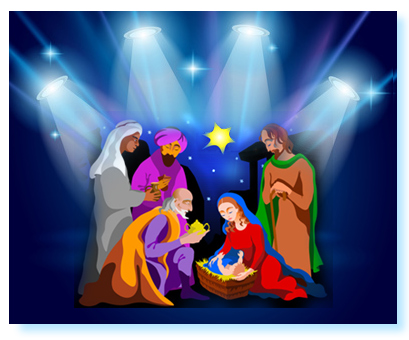In Mexico, Christmas is the best season of the year. With the fiesta-loving, lively nature that sets us apart, we Mexicans have styled this religious celebration very much in our own fashion. So much so that perhaps no where else in the world do so many traditions exist to celebrate it, from asking for room at the inn, to remembering the road Mary and Joseph took to Bethlehem, to piñatas, those big star-shaped clay and cardboard figures that are smashed with heavy sticks to release their sweets and seasonal fruits as gifts to the children…
And the “pastorelas”! There is no Christmas Season without these pastoral dramas of the Nativity. Whether in remote towns or in the big Mexican cities, pastorelas set the stage for the whole of December and leave us, through their playful language and funny situations, the most important message of the season: Good always overcomes Evil.
Pastorelas are plays that recreate the biblical passage where the shepherds follow the Star of Bethlehem to find the Christ Child. In order to reach the birth place of the Redeemer, they have to experience a series of changes in fortune and confront the Devil, who will do everything possible to prevent them from completing their mission. It is at that moment that the Archangel Michael intervenes to defend the shepherds on their journey.
Well, that’s the general idea of the pastorelas. They are very different today; the fact is, they were already very different when they were first presented hundreds of years ago, being one of Mexico’s oldest traditions. Imagine that you are back when the Spaniards reached the New World and began to colonize its inhabitants, instructing them in the Catholic fait
In Tenochtitlan, the great capital of the ancient Mexicans or Mexica, people entertained themselves with an art form that combined song, theater and dance. Performances were greatly enjoyed in the plazas and open spaces, where the actors tended to make jokes, pretending they were drunk, sang and gave recitations for the townspeople, who thundered their applause.
For the Mexica, the play was not just a form of entertainment, but a way to communicate with their gods, as well. Before the altars, in the smoke of the aromatic copal, the priests acted out battles, played warriors at victory and in their defeat. This is how they informed the deities who ruled their days, simultaneously handing down their history to the entire people.
The play was so important for the Mexica that they had professional singers, actors, dancers and buffoons; poets and orators, as well as memorization experts: remember that the Mexica had no alphabet, just a picture-based type of writing that represented objects or sounds. There were also people who produced the ceremonial vestments, jewels, plumed feathers of exotic birds, and fabrics, something quite similar to what we would call today, an innovative clothing designer.
When the Spanish conquered Tenochtitlan in 1521, these specialists ended up with no work and no stage. This situation actually lasted for a very short time, however, because the Franciscan monks who arrived in the New World between 1523 and 1524 quickly became aware of the Mexicas´ artistic sensitivity and took advantage of it to lay a bridge between two cultures that had nothing in common.
Already in Italy and Spain, the Franciscans had observed the advantages they reaped by teaching the faith this way. Only a couple of centuries before, the Iberian Peninsula had seen the initial representation of “autos” , that is, acts or actions inspired by the most important biblical passages or by the lives of saints. And they were quite successful.
As a result, it was completely natural for the Franciscans, in order to evangelize the indigenous peoples en masse, to explain the most important passages of Christ’s life graphically, through a play for example.
The pastorela tradition is said to have begun in a little town called Acolman, a short distance from the Teotihuacan pyramids, where the Franciscans arrived in 1528. Other versions say that Cuernavaca, i n the State of Morelos, was the birth place of this deep-rooted tradition. Whether Acolman, or Morelos, the fact is that the force behind them lay in the Franciscans, and the artistic ability in the indigenous people.
Another truism is that Acolman is the origin of another beautiful Mexican custom. It was here that Fray Pedro de Gante gathered a group of natives for the singing of hymns in celebration of Christmas, an event that would later turn into “asking for room at the inn”.
With activities like this, the Franciscans earned the trust of the Acolman inhabitants and introduced them to religious activities. In the beginning, they accepted the indigenous people´s belief that the theatrical presentations of biblical scenes had a certain “power of purification”, and consequently , flowers and songs were included “to keep evil spirits away”.
Within a very short time, the indigenous people took over the entire production of the pastorelas . They were the actors and musicians; they produced the sets and made the costumes… They are even thought to have translated or written the texts to/in Nahuatl, the language of the Mexica, something fundamental to the evangelizing mission of the stagings.
The indigenous people were much taken by the story…


